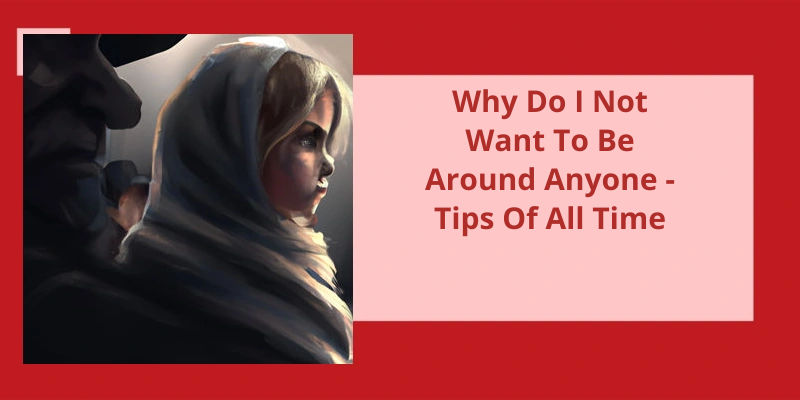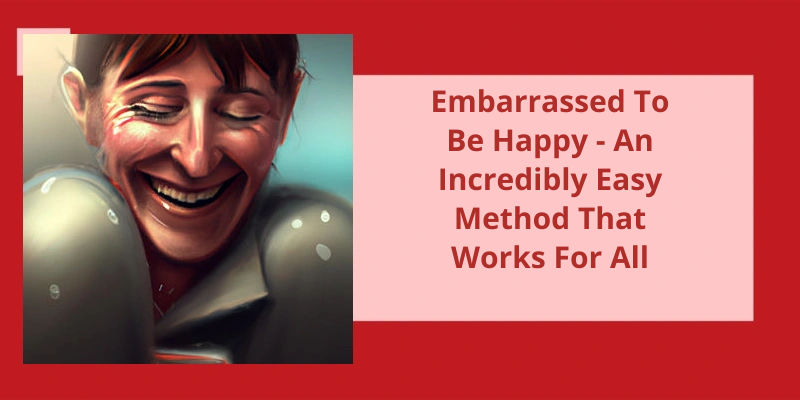In a world that emphasizes the importance of socialization and connection, there are individuals who find themselves grappling with an overwhelming desire to distance themselves from others. This inclination may arise from various psychological factors, such as anxiety, depression, or trauma. These internal challenges can create a deep sense of fear, withdrawal, and an overall inability to effectively connect with those around them. The complexities of these experiences often lead affected individuals to seek guidance and tips on how to navigate this overwhelming desire to be alone. In this blog post, we aim to explore the reasons behind why some individuals don’t want to be around anyone, while providing valuable tips and insights to foster healthier relationships and personal well-being.
Is It Bad That I Don’t Like Being Around People?
Is it bad that I don’t like being around people? You may just be an introvert and spending time alone is how you recharge and process the world around you. In a society that values extroversion, being introverted can sometimes be seen as a negative trait.
Spending time alone can be incredibly beneficial for introverts. It allows them to restore their energy levels and give their minds the space they need to process their thoughts and experiences. While extroverts thrive in social situations, introverts often find solitude to be the most fulfilling and rejuvenating state. So, if you find yourself feeling drained and exhausted after social interactions, it’s completely okay to seek solace in your own company.
It’s also important to recognize that not wanting to be around people doesn’t make you weird or abnormal. Each individual has their own preferences and needs when it comes to socializing. Some people thrive in the company of others, while others may find it overwhelming or draining. There’s no one-size-fits-all approach to socializing, and it’s essential to respect and honor your own boundaries and preferences.
Furthermore, not wanting to be around people doesn’t mean that anything is wrong with you. It can be easy to internalize societal norms and feel like you need to conform to extroverted standards. However, it’s crucial to remember that everyone is unique, and there’s no right or wrong way to be. Embracing who you’re and what makes you comfortable is the key to leading a fulfilling and authentic life.
It’s perfectly normal to not want to be around people. Whether you’re an introvert who recharges through solitude or simply prefer your own company, there’s nothing wrong with prioritizing your own well-being. Embrace your introverted nature, honor your boundaries, and surround yourself with understanding individuals who respect and support your need for solitude. Remember, being true to yourself is the best way to live a happy and fulfilling life.
The Benefits of Solitude for Introverts
For introverts, solitude offers numerous benefits. It allows them to recharge and regain energy in a peaceful environment. Being alone provides an opportunity for deep reflection, self-discovery, and introspection. Without the presence of others, introverts can freely indulge in their hobbies, interests, and personal pursuits. Solitude also encourages independence, creativity, and enhanced problem-solving skills. It serves as a sanctuary for introverts to escape the overwhelming and stimulating nature of social interactions. By embracing solitude, introverts can find a sense of inner peace and personal fulfillment.
One possible explanation could be introversion, with individuals preferring solitude and finding social interactions draining. Additionally, past negative experiences or a fear of judgment may contribute to these feelings of discomfort. It’s important to understand that personal preferences and individual differences play a significant role in how we perceive and engage with social situations.
Is It Normal to Not Like Being Around People?
Feeling a sense of discomfort or even dread around the idea of socializing isn’t uncommon. Many people experience a preference for solitude or a need for space and quietness. However, when this dislike of being around others becomes a constant and overwhelming feeling, it may be worth exploring the underlying reasons.
One possibility is that certain psychological factors play a role. Conditions such as social anxiety disorder or introversion can make social interactions challenging and draining. These individuals may find it mentally and emotionally exhausting to be around others, leading to a preference for solitude.
Physical health can also impact our desire to be around people. Chronic pain, fatigue, or illness can make socializing feel difficult and exhausting. It’s natural to prioritize self-care and prioritize rest over social activities when dealing with physical limitations.
Furthermore, past traumatic experiences or negative social interactions can leave a lasting impact on ones desire to be around others. Trust issues and a fear of rejection can contribute to a sense of discomfort and avoidance of social situations.
Emotional factors can also come into play. Depression and low self-esteem can create feelings of unworthiness or a belief that one would burden or inconvenience others by being present. As a result, a person might withdraw from social interactions to avoid these negative emotions.
While it’s normal to have periods where you prefer solitude, it’s essential to evaluate if this dislike of being around others is interfering with your overall well-being. If it becomes a significant concern, consider seeking professional help to identify and address the underlying causes. Remember that everyones needs and preferences differ, and it’s okay to prioritize your mental and emotional well-being.
Coping Strategies for Introverts in Social Situations
- Take breaks: Find a quiet space to recharge and gather your thoughts during social events.
- Set boundaries: Communicate your need for alone time or limit the length of social engagements.
- Practice deep breathing: Use deep breathing exercises to manage anxiety and stay grounded.
- Find a support system: Surround yourself with understanding friends who respect your introverted nature.
- Prepare in advance: If possible, gather information about the event or people attending to feel more at ease.
- Engage in activities you enjoy: Find hobbies or activities that you truly enjoy and participate in them to reduce stress.
- Focus on one-on-one interactions: Seek out deeper connections with individuals rather than large group settings.
- Practice self-care: Prioritize self-care routines to maintain emotional well-being, such as getting enough sleep and exercising.
- Use non-verbal cues: Utilize body language and non-verbal cues to communicate your comfort level and boundaries.
- Reflect and recharge: Take time after social events to process your feelings and recharge your energy.
Source: Why do I dislike being around people?..
Conclusion
Anxiety, depression, and trauma are common mental health issues that can severely impact social interactions. Individuals with anxiety may experience overwhelming worry and fear in social situations, making them want to avoid any form of socializing. Depression can cause individuals to feel emotionally drained and lack the motivation to engage in social activities. Those who’ve experienced trauma may find it difficult to trust others and make themselves vulnerable in social settings. It’s crucial to acknowledge and address these psychological factors when trying to understand and support those who prefer solitude.






